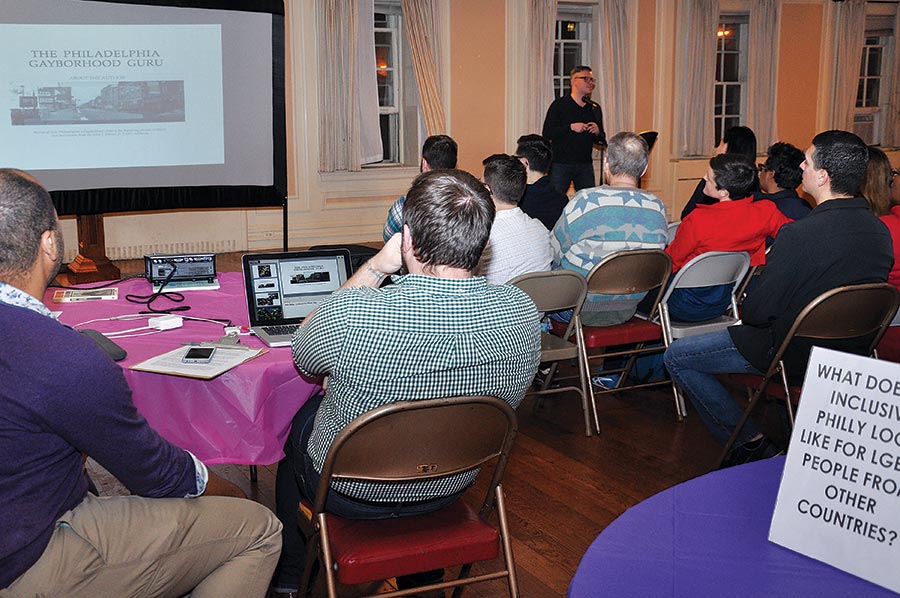Matthew Ray showed two photos in the ballroom of the William Way LGBT Community Center on a recent Friday night. One featured men in leather get-ups; the other a basic fall festival.
The creative director at Chatterblast, a social media-marketing firm, said both represent the same Philadelphia neighborhood, but with a different branding emphasis. When people think of the Gayborhood, they think of OutFest and Pride, Ray said. But Midtown Village has a more family- and business-friendly image.
“The idea that Midtown Village needed to supplement the name Gayborhood kind of sent a message,” Ray said. “When it was created, it gave us the impression that gay equals bad; that different is unwanted and that diversity is bad for business.”
Ray questioned the idea that “Midtown Village” was a necessary “property trick” to gain investments in the neighborhood.
“Who says we can’t be everything as the Gayborhood to all types of people?” he said. “The Gayborhood is a place for inclusivity. Inclusivity needs diversity to function. We’re going to let everybody in, always. For us to really live the brand of this neighborhood, we have to be proud.”
He noted that the city spends money to put “Gayborhood” on maps and has incorporated it into a marketing campaign: “Philadelphia — Get your history straight, and your nightlife gay.”
Ray addressed about 40 people Dec. 11 for the inaugural Queer Voice in the World event. Speakers explored the idea of home for 10 minutes each.
R. Eric Thomas, program director at William Way, conceived the speaker series as a “big-thinker speed-dating” experience. He had participated in several regional TED talks and noticed an uptick in queer people sharing their stories.
“I think we’re at a point in our community where we have the history and privilege to talk about ourselves as a full people,” Thomas said.
“One of the ambitions I have for this program,” he told people before the speakers started, “is that we are able to see there are people who think the way we think, and, more importantly, that there are people who don’t think the way we think.”
The next Queer Voice in the World event takes place in March with the theme “body.” In September, leading up to the presidential election, speakers will discuss the idea of nation.
At the first event, Ray spoke alongside six others: Bill Chenevert, staff writer for South Philly Review; Caitlin Pratt, coach supervisor for Valley Youth House; Rafael Damast, curator and visual-arts programmer for Taller Puertorriqueño; Katie Sgarro, co-founder of AsylumConnect; David Norse, minister for pastoral care and LGBTQ belonging at Broad Street Ministry and Arch Street Presbyterian Church; and Ben Jones, development director at William Way.
Pratt hammered home the point that 40 percent of youth experiencing homelessness across the country identify as LGBT. But, she said, the question of why should look for answers beyond the idea that unsupportive parents kick LGBT kids out of the house. Pratt said racism, poverty and the foster-care system should get attention as contributing factors.
In surveys of Philadelphia’s homeless youth, Valley Youth House found that 32.5 percent had been in the foster-care system at some point, Pratt said.
“There are things we can do as a community,” she said. “We can make sure that in our world we are mentioning this [issue] all the time. We can make sure our faith communities are supportive and are talking about these things on a regular basis. We can’t discredit faith communities.”
Norse agreed with the importance of a spiritual home. He publicized a list of faith traditions that have ordination and marriage equality, including Presbyterians, Evangelical Lutherans, Episcopalians and those in the Church of America and United Church of Christ.
Norse advised people to visit www.gaychurch.org to find out if their faith operates as LGBT-affirming.
He also talked about the faith work he does in Philadelphia.
Broad Street Ministry ripped out its pews to make space to serve over 90,000 meals a year to vulnerable populations in the city, Norse said. He added that over 3,000 people use the church as a mailing address.
“It’s one of the most basic human services that you can think about,” Norse said. “Without a mailing address, it’s impossible to be able to access Social Security, food stamps, WIC [Women, Infants and Children].”
“That’s a spiritual home, but it doesn’t look like a lot of other places that people identify as a spiritual home,” he said.
For more information on the Queer Voice in the World speaker series, email R. Eric Thomas at [email protected].

